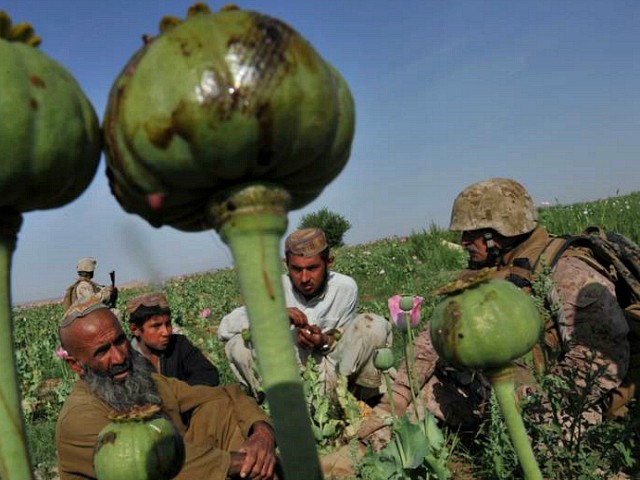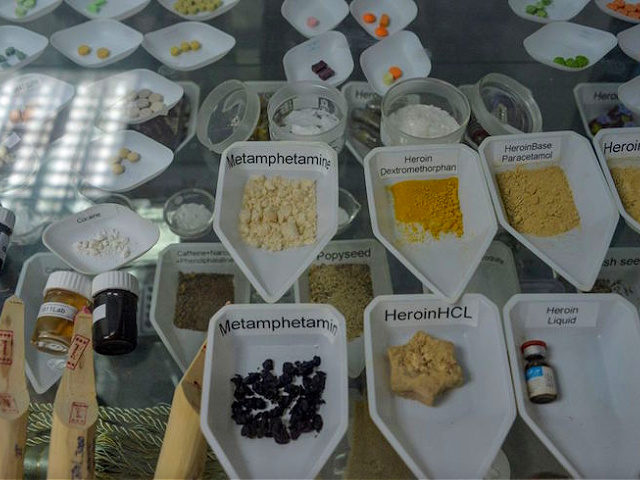Methamphetamine has recently become the center of Afghanistan’s “fastest-growing” illicit drug industry, Afghanistan’s Tolo News reported on Tuesday, citing an original report by the Washington Post.
While Afghanistan’s illegal opium industry has long been established as the nation’s leading source of illicit income, the recent rise of methamphetamine production in certain regions of the war-torn nation has seen the industry transform into a major competitor to poppy cultivation, according to a report published by the Washington Post on May 2.
The newspaper wrote:
Afghanistan’s fastest-growing drug industry operates from desert outposts in plain view.
One of its most bustling hubs, some five hours west of Kandahar, can only be reached by miles of dirt tracks that lead to a row of dusty shops topped with Taliban flags. Wholesalers like Abdulwadood work openly here, moving dozens of kilos of methamphetamine every week.
The Washington Post on Monday described Afghanistan’s methamphetamine industry as “growing at breakneck speed,” citing as its evidence for the claim a “sudden boom in meth production” in Afghanistan, though the newspaper did not disclose exactly when this supposed surge in production occurred. The publication implied that the spike in Afghanistan’s methamphetamine production took place in recent months while acknowledging that the industry has been established in Afghanistan for at least six years.
“The sudden boom in meth production came after drug traffickers discovered a potential bonanza in a native plant called ephedra — known here as oman — which grows wild and is a natural source of the drug’s key ingredient,” the Washington Post reported.
The newspaper again referred to this methamphetamine business “boom” later in the article, writing, “Afghan meth once struggled to compete globally. ‘But then all this ephedra was discovered, growing wild in the mountains,’ said Sara Hakimi, a former [Afghan] Foreign Ministry official specializing in counternarcotics. ‘You could just take it, dry it and sell it.'”
Various news outlets, including Breitbart News, reported in April 2021 that Afghanistan’s methamphetamine industry was then experiencing newfound levels of success. Chemical & Engineering News was one such publication, and it detailed how Afghans had recently switched to producing methamphetamine from the natural ephedra plant in lieu of a more widespread method involving over-the-counter pharmaceuticals. The science magazine wrote:
Ephedra — known as oman in some areas of the country and bandak in others — has grown wild and abundantly across Afghanistan’s mountainous central highlands for centuries. Today, the plant is behind the dramatic growth in the methamphetamine industry in Afghanistan.
Around the world, most meth is made from synthetic ephedrine, a decongestant found in cough and cold products. And before 2017, producers in Afghanistan opted for this precursor as well. … They usually obtained ephedrine, or the related chemical pseudoephedrine, from store-bought medications. But sourcing enough to support meth production is slow and expensive.

Law Enforcement Professional embedded with the Marine corps questions opium poppy farmer Abdul Manan and his two sons in Helmand province on April 25, 2011. (Photo credit should read BAY ISMOYO/AFP/Getty Images)
Taliban members currently in charge of Afghanistan’s central government have officially voiced their opposition to all illicit drug industries within Afghanistan, according to the Washington Post. The newspaper on May 2 quoted Afghanistan’s current deputy minister for counternarcotics, Abdul Haq Hamkar, as saying the following in an interview shortly before the Taliban took over Kabul in August 2021: “Let me be clear that from now on, no one in any part of the country will be allowed to cultivate or produce either oman, or heroin, or hashish, or opium.”
In the same article, the Washington Post acknowledged that Taliban officials look the other way when patrolling markets hawking methamphetamine-based products.
“Sellers at the meth bazaar in rural western Afghanistan have long been free to ply their trade,” the newspaper reported on May 2.
“The previous [U.S.-backed] government [of Afghanistan] largely turned a blind eye, said Abdulwadood [an Afghan methamphetamine seller], and the Taliban have taken the same approach since coming to power. Though Taliban fighters sometimes inspect the market, they have not tried to shut it down,” the publication relayed.
The United Nations and other international organizations have long accused the Taliban of profiting from Afghanistan’s illicit opium industry while publically claiming to oppose the trade as morally at odds with its fundamentalist Sunni Islam beliefs. This has led global observers to speculate that the Taliban — which seized control of Afghanistan’s seat of government in Kabul on August 15, 2021 — might tolerate Afghanistan’s emerging methamphetamine industry in a similar manner.

COMMENTS
Please let us know if you're having issues with commenting.